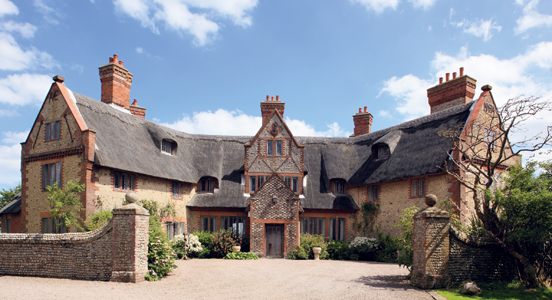Big Cottage, Little Cottage

I received this email recently asking about what size house qualifies as a “cottage.”
Bill:
In my recent perusings on “Houzz“, I’ve read that the the term “cottage” properly refers to a single family structure up to to about 1,200 sq. ft. Yet, here we see in “Houzz” a veritable banquet of styles in the excess of 1,200 sq. ft, still called “cottages.” Is this merely a general term denoting “charm” or is their really any validity in a term that perhaps is an anachronism? Your opinion also on house plans via the internet, what comes first the land or the plan?
Here is my answer:
I think that the term “cottage” is still valid and does refer to a small, quaint, and charming house. But the term has added an additional meaning and has come to be a descriptive word that describes a house that feels cozy and unpretentious. But as you can see on Houzz.com, cottage refers to grand houses, as well. It’s a lot like the term “French Country.” What passes for French Country would never actually be found in the countryside of France. But it does connote a look and style.
I have to admit to being guilty of designing big cottages myself. I recently completed a “cottage” that was over 8000 square feet. In many ways, it did end up having cottage qualities. The rooms were not overly large. The bulk of the house was broken up in smaller parts. And most importantly, I designed the living, dining, and eating spaces, the spaces the owner spends the most time in, to be open to each other and have windows on both the east and west sides of the house. Because you can see out in opposite directions when you are in that part of the house, you feel you are in a much smaller house. It actually has a cottage feel and not the feel of an 8000 square foot house.
My attitude is terms like “cottage” and “French Country” are just terms of convenience. Don’t let them dictate what you design. Design what you like!
To your second question about what comes first, the land or the plan, I say, “Always the land.” The biggest mistake I consistently see in house design is a house that does not respond to its site. Improper orientation, houses forced onto sloped lots they weren’t intended for, and awkward entry sequences are the usual maladies. Start with the land, analyze it, and design your house to fit it and take advantage of what the land has to offer.
I enjoy receiving and answering questions. If you have a question, please feel free to send it to me. Just click “Ask Bill” and your question will get sent right to me.
I hope this information is helpful to you. You might want to get yourself a copy of my best-seller, Designing Your Perfect House. It is chockfull of valuable tips and advice that will save you many times the cost of the book on your house building or remodeling project. You might also like The Well-Centered Home: Simple Steps to Increase Mindfulness, Self-Awareness, and Happiness Where You Live. It will show you how to make your home a happy place.



Fascinating article on “big cottage, little cottage”! I love the exploration of how terminology can be subjective and the focus on achieving the desired feel over strict definitions. As an SEO specialist for UK loft boarding services, I’m curious – could “cozy cottage” aesthetics extend to utilizing a converted loft for a dedicated space, maximizing the “little cottage” charm while gaining valuable square footage? What are your thoughts on incorporating traditional cottage elements (exposed beams, natural textures) into a modern loft conversion?
Just think of the images that come to mind when you think of a “cottage.” And also think of what a cottage isn’t. If you include materials and details that fit the imagined images of a cottage, I think you could fairly call the loft a cottage.